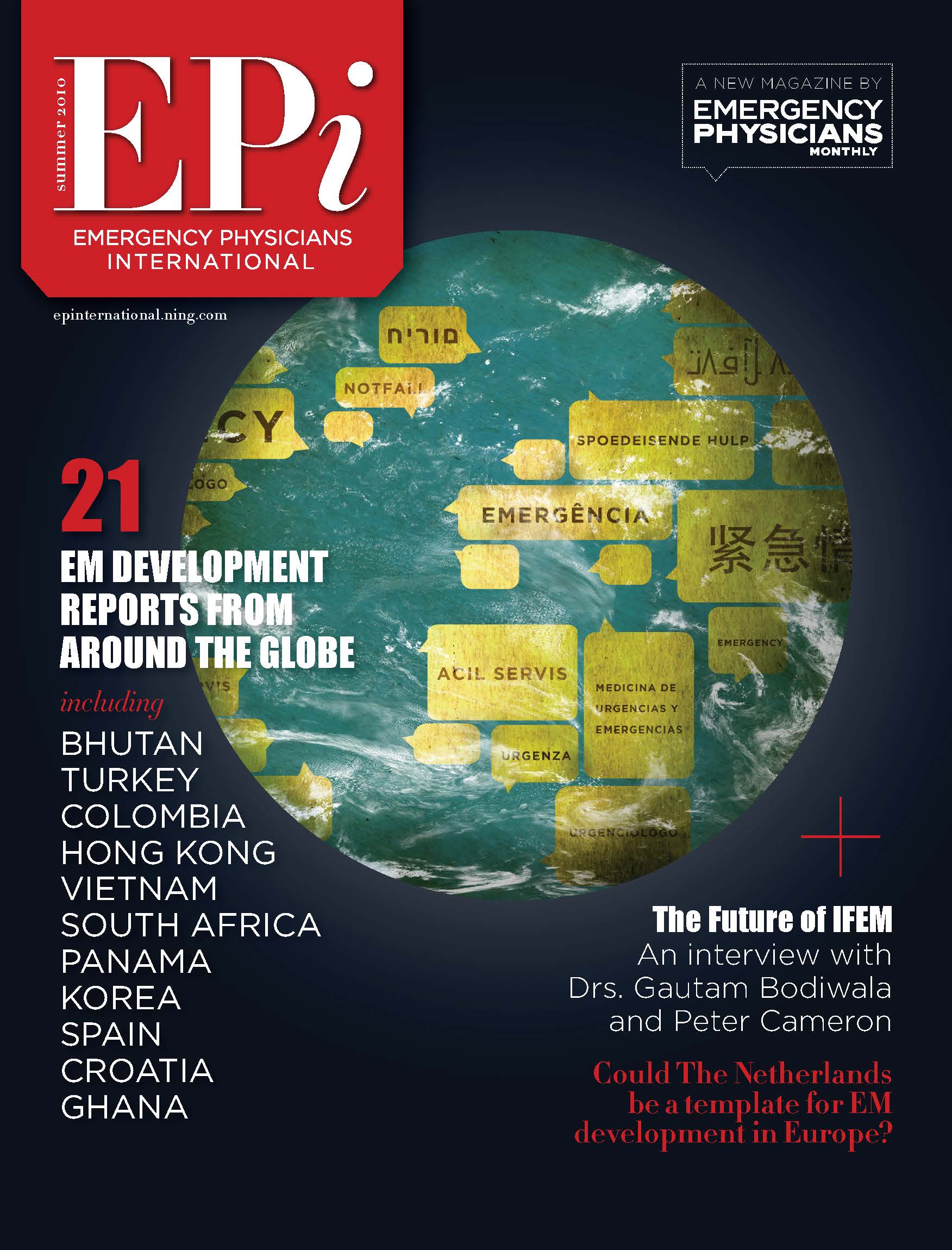COVID-19 and the Bursting Bubble of ER Management
The following op-ed piece was transcribed from an audio recording, and lightly edited for clarity by L. Esther Hibbs, Managing Editor.
My name is Terry Mulligan. I’m currently the vice president of the International Federation of Emergency Medicine (IFEM) and I’m on the board of directors of the American Academy of Emergency Medicine (AAEM). Over the last 20-25 years or so, I've been deeply involved in emergency medicine, international emergency medicine, and global emergency medicine development. I think all of us are up to our ears with working in the ER and taking care of all of our emergency patients – a job that's been increased and intensified especially the last six or eight months because of the unfortunate COVID-19 pandemic. I say this is unfortunate because a lot of this overwork and high stress for emergency physicians and for the healthcare system potentially could have been avoided.
I think over the last weeks and months, this pandemic and its crippling impact on our emergency care system within the healthcare system has pulled the curtain aside and laid bare the already overwhelming, overworked, overstressed state of emergency medicine, the emergency departments of hospital care, and the healthcare system in general. I think it's obvious that this pandemic has had a huge effect on almost every aspect of our society – not just healthcare. It's also shown how many of these different systems previously looked at as stand-alone or disconnected are deeply connected. For example, the economic impact of the pandemic is directly affecting the healthcare system and its proper functioning because so much of the United States’ healthcare system depends on the state of the general economy, the state of people’s employment, and the insurance that often comes with the people's employment (or the lack thereof. I think this pandemic has the chance to pull the curtain aside on a crisis we've been facing in emergency medicine for probably 15 or 20 years. The crisis is that in lots of areas of medicine and in healthcare in general, but in the emergency department specifically, the current business and economic structure of the healthcare system forces us to run healthcare on a very thin margin. Now, it is being laid bare and made obvious to almost anybody who wants to or cares to look at it.
This pandemic has hit the emergency department in a multitude of ways. In a material sense, the effects include shortages of personal protective equipment (PPE), of ventilators and medications, and other emergency care resources. Interpersonally, effects include staffing problems with physicians and other healthcare workers becoming sick and risking their lives along with those of their family, and risking being fired for speaking out against patient safety issues or PPE issues. Being fired or transferred for this is unfortunately common for us. It is important to show how the corporate practice of medicine has really crippled emergency services in the USA. This was an obvious problem even before the COVID-19 crisis, but I think the pandemic really put this into the forefront of our minds. The pandemic has served as a stress test for the healthcare system. It shows the system was already running in the red. Under standard circumstances, it's not safe to keep an engine running in the red, and we are running at 7000-8000 RPM. Then, when a crisis such as the pandemic comes along, it becomes clear there is not any extra capacity in the system left over to take care of even a small surge, much less a giant surge like what has happened here. Maybe one of the only good things to come out of this is the giant spotlight now shining on how the healthcare system and the emergency system has been running on very low resources. Hopefully, people outside the field of Emergency medicine will see how the system can really improve itself after we get through the current crisis.
In the next 6 to 12 months, we will probably have some sort of vaccine. Within the next 12 to 18 months, we could potentially be out on the other side of this crisis. Between now and then, I hope we will continue to shine the spotlight on the emergency care system’s vital role in hospitals, the greater healthcare system, and the general economy.
Training people to take care of acute unscheduled emergencies is a relatively new concept. Emergency medicine is just about 55 years old in the United States and the United Kingdom. In most other places around the world, it is much younger than that. This skillset has not been adopted around the world, but unfortunately has also been abused in the USA.
One of the books that has been written about emergency medicine history in the USA by Dr. Brian Zink is entitled “Anyone, Anything, Anytime.” The book explains how we have prepared ourselves to take care of any and all emergencies. I think we've done this very well clinically, scientifically, and academically. After a very initial, short period of inquisitiveness and resistance from the rest of the healthcare world, It has turned into a harsh reminder to “be careful what you ask for, because you just might get it.” When we asked for “anyone, anything, anytime,” the rest of the healthcare system eventually said “Fine, take it! You want the nights, you want the weekends, you want the holidays, you want social problems, you want the behavioral health problems, you want the patients who have fallen through the cracks of the rest of the healthcare system – you can have them!” The healthcare system is looking to the emergency department as a clean up crew the emergency department serves a multiple layered safety-net.
I think a lot of people might be familiar with how the emergency departments serve as a safety net for patients: patients who have nowhere else to go. These are patients who might not have insurance, patients who have no insurance or are underinsured and therefore did not go to their primary care doctor or didn't take their medicines, so they come in with an acute emergency that potentially could have been prevented with good primary care coverage. We are also the safety net for patients who have conditions their primary care services cannot care for. We do not know everything about medicine yet, so sometimes when you have an acute medical emergency it doesn't matter if you've had good primary healthcare: you still need acute care now. If somebody has chest pain or breaks their arm right in front of their primary care physicians office, those people often still go to the emergency department. In each sense, we are the primary safety net for patients.
The second layer of the safety net is for other specialists. Almost everywhere, inside and outside of the USA, there is a huge shortage of other Medical Specialists: neurosurgeons, neurologists, orthopedists, cardiologists, pediatricians, et cetera. Not only do patients have trouble getting timely appointments, but specialists are few and far between, with restricted hours. They often cover multiple hospital systems and patients have to wait weeks or months for an appointment or a referral, even from the emergency department. In turn, we act as a safety net for the other specialists.
To me, the most important part offered by emergency department services is the third layer: we are really the safety net for the cracks and the holes in the healthcare system. Our healthcare system is not perfect. We have tens of millions of people who are underinsured or uninsured. The healthcare System does not give equal healthcare to people from different types of socio-economic status and different geographic areas. The system has a lot of cracks and people who aren't treated well either intentionally or unintentionally by the healthcare system often come into the system as emergencies. This completes the triple safety net: we’re the safety net for patients with nowhere else to go, we’re the safety net for the specialists, and we’re also the safety net for the hospital and for the healthcare system in general. We’re there to catch people who fall through the cracks.
I like to imagine the emergency department as the clean up crew following behind the Mardi Gras parade, sweeping up debris and the refuse left behind after the parade goes through. I think our healthcare system is pretty good, but it doesn't serve everything. The system does not serve patients in the emergency department. In one sense, we're kind of a victim of our own success. We have accomplished a significant amount, well: critical care, emergency care, acute episodic care and streamlined patient entry into the healthcare system. In fact, we’ve done it so well that the rest of the hospital system relies on us. They take advantage of us.






